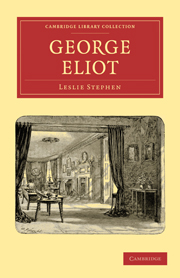Book contents
- Frontmatter
- Contents
- CHAPTER I EARLY LIFE
- CHAPTER II COVENTRY
- CHAPTER III “THE WESTMINSTER REVIEW”
- CHAPTER IV “SCENES OF CLERICAL LIFE”
- CHAPTER V “ADAM BEDE”
- CHAPTER VI “THE MILL ON THE FLOSS”
- CHAPTER VII “SILAS MARNER”
- CHAPTER VIII MIDDLE LIFE
- CHAPTER IX “ROMOLA”
- CHAPTER X “FELIX HOLT”
- CHAPTER XI “THE SPANISH GYPSY”
- CHAPTER XII “MIDDLEMARCH”
- CHAPTER XIII “DANIEL DERONDA”
- CHAPTER XIV CONCLUSION
- INDEX
CHAPTER XI - “THE SPANISH GYPSY”
Published online by Cambridge University Press: 05 July 2011
- Frontmatter
- Contents
- CHAPTER I EARLY LIFE
- CHAPTER II COVENTRY
- CHAPTER III “THE WESTMINSTER REVIEW”
- CHAPTER IV “SCENES OF CLERICAL LIFE”
- CHAPTER V “ADAM BEDE”
- CHAPTER VI “THE MILL ON THE FLOSS”
- CHAPTER VII “SILAS MARNER”
- CHAPTER VIII MIDDLE LIFE
- CHAPTER IX “ROMOLA”
- CHAPTER X “FELIX HOLT”
- CHAPTER XI “THE SPANISH GYPSY”
- CHAPTER XII “MIDDLEMARCH”
- CHAPTER XIII “DANIEL DERONDA”
- CHAPTER XIV CONCLUSION
- INDEX
Summary
Felix Holt, as we have seen, had been taken up at a time when she was in despair of finishing a drama, which Lewes for once did not altogether approve. She had written three or four acts, and on reading the old work again “found it impossible to abandon it.” The conceptions moved her deeply, and had “never been wrought out before.” Still it required entire recasting. Some of her views at the time are given in an interesting letter to Mr. Frederic Harrison (15th August 1866). He had, it seems, proposed some theme for her consideration. “That,” she says, “is a tremendously difficult problem which you have laid before me; and I think you see its difficulties, though they can hardly press on you as they do on me, who have gone through again and again the severe effort of trying to make certain ideas thoroughly incarnate, as if they had revealed themselves to me just in the flesh, and not in the spirit. I think æsthetic teaching is the highest of all teaching, because it deals with life in its highest complexity; but if it ceases to be purely æsthetic, if it lapses anywhere from the picture to the diagram, it becomes the most offensive of all teaching.” She proceeds to point out the “agonising labour to an English-fed imagination to make out a sufficiently real background for the desired picture—to get breathing individual forms and group them in the needful relations, so that the presentation will lay hold on the emotions as human experience—will, as you say, ‘flash’ conviction on the world by means of aroused sympathy.”
- Type
- Chapter
- Information
- George Eliot , pp. 158 - 171Publisher: Cambridge University PressPrint publication year: 2010First published in: 1902



